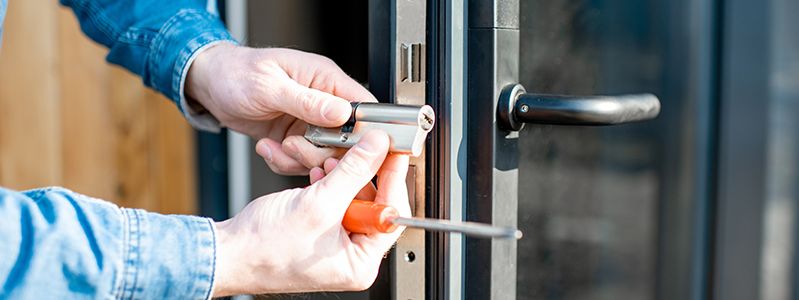
Locksmith certification
A locksmith certification is required for any person who services, installs, repairs, rebuilds, rekeys, repins or adjusts locks, hardware peripheral to locks, safes, vaults, safe deposit boxes or mechanical or electronic security systems.
Who needs a locksmith certification?
Any person who services, installs, repairs, rebuilds, rekeys, repins or adjusts locks, hardware peripheral to locks, safes, vaults, safe deposit boxes or mechanical or electronic security systems. The certificate is required in Oregon even if you hold a locksmith license or certification in another state.
Oregon law (701.490) exempts the following people from locksmith licensing requirements.
- A person offering key duplication services at a fixed location that does not provide any other locksmith services
- Class A or B limited energy technicians working within the scope of their licenses
- Tow truck operators working for a certified tow truck business
| - Construction contractors if not advertising locksmith services
- Manufacturer of manufactured structures
- Property owner or owner’s employee working on owner’s property
- Property management company working on managed property
| - Real estate property manager or employee working on managed rentals
- Landlord or landlord’s agent
- Manufacturer of locks
- Representative of lock manufacturer, wholesaler or retailer
|
Apply for your Locksmith certification
Most of the application process is online. However, once you complete the online steps, you must still associate your locksmith certification with a CCB license. (See details below.)
These are the online steps:
- Register for a CCB Online Services account.
- Request 'Locksmith Certification' as an online service.
- Fill out the
Locksmith Certification Application.
- Pay for the application and test.
- Take and pass the test.
- Complete the Criminal History Information.
- Pay $60 for the two-year certification.
You must have Internet connection and be able to pay the renewal fee using a credit or debit card.
Criminal History
If you disclose any of these crimes, you will be asked to submit more information to the CCB. Conviction of any of the following crimes in the past seven years may disqualify you for certification.
- Murder
- Kidnapping
- Assault in the first degree
- Rape
| - Sodomy
- Unlawful sexual penetration
- Arson in the first degree
- Robbery in the first or second degree
| - Burglary in the first or second degree
- Theft in the first or second degree
- Theft by extortion
- Aggravated theft in the first degree
|
Locksmith Certification Test
The testing fee is $60. The online test consists of 80 questions. Questions answered incorrectly during the initial test will be displayed at the end of the 80 questions. You can review those questions, locate the correct material and answer again until you have answered all questions correctly. You may use the following reference materials to study for the test:
The Complete Book of Locks and Locksmithing 6th Edition. This book can be purchased online and it includes a practice test.
- Author: Bill Phillips
- Publisher: McGraw Hill
- ISBN number: 978-0-07-144829-1
The Locksmith Dictionary © 2009
- Developed by the Lock Industry Standards and Training Council
- Click
here to download/view.
Associating your locksmith certification with a CCB license
Before we activate your certification, you must associate your locksmith certification with a residential construction contractor license (such as a residential general or specialty license). If you do not have a CCB license,
learn how to apply. If the CCB license already exists, the owner or responsible managing individual should log into their CCB
Online Services account and follow these steps:
From the Business License Detail screen:
- Click on "Associate NEW OCLS" (under the heading "Additional license/certificates"),
- Type in the locksmith certificate number,
- Click "Add"
If your business provides locksmith services exclusively, you may apply for a residential locksmith services contractor license. However, under this license you may ONLY provide locksmith services (see definition). You may not provide ANY other construction services. For example, if a door or door jamb is damaged during a lock installation, you are not legally allowed to fix the damage OR arrange for someone else to fix the damage.
Once associated, contact the CCB to activate your certificate. You may email ccb.info@ccb.oregon.gov or call (503) 378-4621.